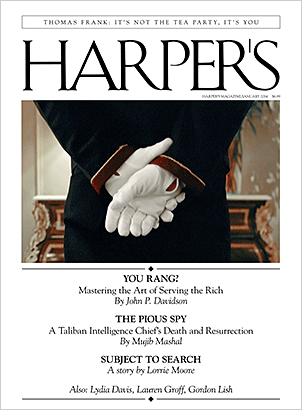Introducing the January 2014 Issue
Mastering the art of serving the rich, a Taliban intelligence chief’s death and resurrection, and fighting for the right to insult the French president
January marks the season-four premiere of the TV series Downton Abbey, the BBC’s latest interpretation of the relationship between neurotic, hopeless rich people and their sly, manipulative servants — a subject we in the United States seem endlessly fascinated by (cf., Upstairs, Downstairs). To give our readers a view of this world, we enrolled writer John Davidson in Denver’s Starkey International Institute for Household Management, a training ground for those who want to enter “private service.” The eight-week course promises to teach students estate management, household maintenance, proper cleaning techniques, and the care of antiques, clothing, and cars — plus the proper way to set a table, serve a formal dinner, and fold toilet paper — and promises that these skills will result in high-paying jobs. In “You Rang? Mastering the art of serving the rich,” this month’s cover story, Davidson describes for us, often comically, his training for a profession most of us associate with another time and place.
It has been more than ten years since Qari Ahmadullah, the Taliban’s last intelligence chief, was reportedly killed by American bombers, his remains supposedly buried in Gazni. a province ninety miles south of Kabul. But reporter Mujib Mashal, who grew up in Kabul, had been hearing rumors that Ahmadullah was still alive. In his report, “The Pious Spy,” Mashal attempts to determine the truth of these rumors. He travels to Gazni, where he talks with Ahmadullah’s brother, Mawlawi Naeem, who runs a madrassa, as well as to other Afghans who may have been Ahmadullah’s associates. Mashal’s story, which also recalls his life growing up under Taliban rule, will leave readers wondering what will happen in Afghanistan after the scheduled 2014 American pullout. Will we see a return of the Taliban, some of whose leaders are presumed dead but in fact may be in hiding, waiting for a chance to rule once more?
Kabir Chibber, whose last article for the magazine (“Blind Appraisal: The European Union rules against contemporary art”) appeared in the February issue, annotates a photograph taken at a rally of the far left in Paris, during which two protesters held up a sign reading “Casse toi, pov’con,” an insult that former French president Nicolas Sarkozy hurled at a voter in 2008. A video of that exchange subsequently went viral, accompanied by differing interpretations of the French phrase, all of them insulting. Since 2008, Sarkozy’s words have been thrown back at him many times, most notably by an activist for the opposition Socialist Party who was subsequently fined €30 for insulting the French president, which has been against the law since 1881. Chibber lays out the history of this “crime” since 1881 and describes the lively debate over the exact meaning of the phrase.
Also in this issue: A charming memoirlike story by Gordon Lish about stickball on the streets of New York; Lauren Groff’s reappraisal of Marjorie Kinnan Rawling’s once-popular novel, The Yearling, on the seventy-fifth anniversary of its publication; a short story by Lorrie Moore; Jonathan Dee’s review of Robert Stone’s new novel; a history of ballooning by Steven Shapin, and Christine Smallwood’s debut as a bimonthly New Books columnist.



